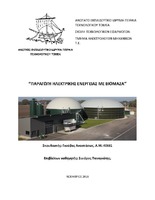| dc.contributor.advisor | Σινιόρος, Παναγιώτης | |
| dc.contributor.author | Γκούβας, Αναστάσιος | |
| dc.date.accessioned | 2016-12-16T11:35:50Z | |
| dc.date.available | 2016-12-16T11:35:50Z | |
| dc.date.issued | 2016-11 | |
| dc.identifier.uri | http://okeanis.lib2.uniwa.gr/xmlui/handle/123456789/3140 | |
| dc.description.abstract | Από την αρχαιότητα η παραγωγή ελαιόλαδου αποτελούσε κύρια βιομηχανία για την Ελλάδα και για πολλές άλλες χώρες της Μεσογείου. Η ελιά είναι άρρηκτα συνδεδεμένη με την ιστορία της Ελλάδας και η επεξεργασία της αποτελεί κομμάτι της παράδοσης της. Η Ελλάδα καταλαμβάνει την τρίτη θέση ανάμεσα στις χώρες με την μεγαλύτερη ελαιοπαραγωγή πίσω από την Ισπανία και την Ιταλία. Είναι γεγονός, ότι κατά την παραγωγή του ελαιόλαδου δημιουργούνται μεγάλες ποσότητες παραπροϊόντων τα οποία είναι επιβλαβή για το περιβάλλον. Έτσι η επιστημονική κοινότητα έχει ερευνήσει μεθόδους για την επεξεργασία των αποβλήτων των ελαιοτριβείων και συγχρόνως την ωφέλιμη εκμετάλλευση τους, όπως είναι η παραγωγή ενέργειας. Οι κύριες κατηγορίες των μεθόδων επεξεργασίας είναι οι φυσικές, οι θερμικές, οι φυσικοχημικές και οι βιολογικές.
Αντικείμενο της παρούσας πτυχιακής εργασίας είναι η έρευνα και η παρουσίαση των τρόπων επεξεργασίας των παραπροϊόντων της ελαιουργίας, κυρίως των υγρών αποβλήτων με μεγαλύτερη έμφαση στην μέθοδο της αναερόβιας χώνευσης με σκοπό την παραγωγή ηλεκτρικής και θερμικής ενέργειας. Ακόμα, θα πραγματοποιηθούν υπολογισμοί της παραγόμενης ηλεκτρικής και θερμικής ενέργειας ανάλογα με το παραγόμενο βιοαέριο. Τέλος, θα γίνει μια οικονομοτεχνική προσέγγιση της μονάδας επεξεργασίας των αποβλήτων και παραγωγής βιοαερίου. | el |
| dc.format.extent | 106 σελ. | el |
| dc.language.iso | el | el |
| dc.publisher | Α.Ε.Ι. Πειραιά Τ.Τ. | el |
| dc.rights | Αναφορά Δημιουργού-Μη Εμπορική Χρήση-Όχι Παράγωγα Έργα 3.0 Ελλάδα | * |
| dc.rights.uri | http://creativecommons.org/licenses/by-nc-nd/3.0/gr/ | * |
| dc.subject | TPSH::Περιβάλλον::Απόβλητα | el |
| dc.title | Παραγωγή ηλεκτρικής ενέργειας με βιομάζα | el |
| dc.title.alternative | Electric energy production using biomass | el |
| dc.type | Πτυχιακή εργασία | el |
| dc.contributor.committee | Μανουσάκης, Νικόλαος | |
| dc.contributor.committee | Μεταξά, Φωτεινή | |
| dc.contributor.committee | Σινιόρος, Παναγιώτης | |
| dc.contributor.department | Τμήμα Ηλεκτρολόγων Μηχανικών Τ.Ε. | el |
| dc.contributor.faculty | Σχολή Τεχνολογικών Εφαρμογών | el |
| dc.subject.keyword | Αναερόβια χώνευση | el |
| dc.subject.keyword | Περιβαλλοντικές επιπτώσεις | el |
| dc.subject.keyword | Υγρά απόβλητα ελαιοτριβείου | el |
| dc.subject.keyword | Βιοαέριο | el |
| dc.subject.keyword | Σύστημα συμπαραγωγής | el |
| dc.subject.keyword | Παραγωγή ηλεκτρικής ενέργειας | el |
| dc.subject.keyword | Παραγωγή θερμικής ενέργειας | el |
| dc.description.abstracttranslated | From ancient times, olive oil’s production played a principal role in industry for Greece and for many other countries of the Mediterranean. Olive is intimately related to Greece’s history and her processing is part of Greek tradition. Greece comes third worldwide between the countries with the biggest olive production, with Spain and Italy possessing the first two places. It is true, that during olive oil’s production great quantities of byproducts are created, which are harmful for the environment. So the scientific community has researched ways for the processing of olive oil’s spoilages and at the same time their beneficial exploitation, such as the production of energy through the anaerobic digestion of olive oil’s byproducts. The subject of this senior thesis is to research and present the different ways of processing the byproducts, certainly the processing of olive oil mill wastewaters that are created during olive oil’s production, emphasizing on the use of anaerobic digestion for electrical and thermal energy production. Moreover, there will be calculation of the electrical and thermal energy production, according to the biogas production. Finally, there will be, a techno economical approach for the wastewater unit treatment, and for the biogas production. | el |


